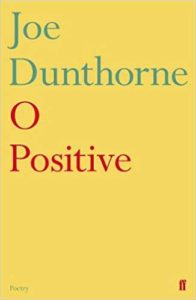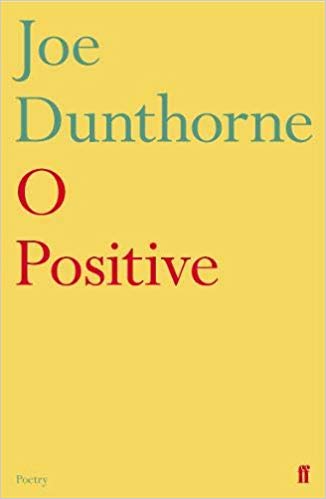
O Positive, says his publisher, ‘is the long-awaited debut collection of poetry from Joe Dunthorne’. Faber seem to have forgotten that they published an earlier, shorter collection in 2010 in the Faber New Poets series. Several poems in this are carried over into the new book.
Though he started out as a poet, Joe is best known as a novelist. Submarine (200) is one of the best coming-of-age stories published in the UK for many years. It was turned into a disappointing film directed by Richard Ayoade, which unaccountably failed to use as its main location the Swansea that gives the novel so much of its colour and particularity.

The new book arranges its short poems – few exceed a page in length – under headings corresponding to the four blood groups: A, AB, B and O: ten poems in each group. I must confess that I find the blood group device a bit hermetic. The overall title, though, O Positive, does set the tone of the collection, which is jaunty and energetic. I read the whole book through in one go. The experience was like eating a box of Leibniz biscuits: you start by nibbling the chocolate border that overhangs the biscuit, then snap the rest in two and devour half, and then, having finished one, find it impossible to stop devouring the rest of the box.
The first poem in the book, ‘A sighting’, gives a fair taste:
As we waited to be torn apart
I remember thinking the bear
looked like an actor in a bear suit
who had quit his frontier theme park
to live in the hills, eat ear-frill fungus,
scratch his pelt on oaks cracked open
by lightning and in time forgot
his name and how to walk so that
when he found us pegging out
the groundsheet with absolute
devotion he sensed in each of us
a black bear beneath the Gore-Tex,
balancing well on our hind legs,
playing at language and marriage,
and his respect for our commitment
to character was why he did not
open us up.
The carpentry of the piece is flawless, with its sonnet-like one-sentence argument, colloquial language flecked with obscurities (‘ear-frill fungus’), comedic alliteration and connections (‘playing at language and marriage’) and brilliant truncated last line (‘open us up’). Its neo-metaphysical play on the theme of make-believe and mutation leave us thinking as well as smiling.

Scenarios in other pieces begin as dreams or daydreams or fantasies, which allow the poet to introduce us to a raree-show of odd characters, and to ambush us with sex, violence and other surprises. He finds himself in bed with First World War soldiers, ‘ancient men’ complete with greatcoats and nightmares. Another lover ends up as a student anatomist’s body. An airport security officer fingers his waist, intimacy and fighting simultaneously in his mind. His children are kidnapped and ransomed. His mother turns into a hypnotist, or turns Oedipal: ‘At thirty-three I finally had the dream / where I made love to my mother. / I kept saying you are my mother / and she said I absolutely am’.
The violence, as in a surrealist film, is gratuitous and can be shocking. ‘Worship’ is a list of instructions for successful sunbathing (‘Lie back. Let the sand create a duplicate / of your spine. Match your breath to the tide.’) before revealing that ‘On the backs of your eyelids, you will likely / see your childhood sweetheart in flames / doused in lamp oil.’
There’s another fine surrealist moment in ‘Old days’:
Remember when everyone on earth
was pregnant except for you
which was a miracleand the babies jangled down on their cords
like masks during sudden
cabin decompression
This is so brilliant an image it’s a pity it peters out into a joke.

Two steady themes of the poems are the self and its presentation. An (imaginary?) Flemish psychoanalyst is allowed to parade his ‘five layers of self’. ‘A sestina for my friends’ ties itself in knots worrying about how the act of placing a copy of W.G. Sebald’s Rings of Saturn in public view will be seen by the poet’s friends. Sometimes the self disappears up itself: ‘I realise I am inside myself, circling my innards. / One of the gulls says: Joe, our time is up’.
This selfiness, and the poems about writing poems, can be tiring, and in the end I found I needed more than poetic chocolate biscuits. For all their formal and linguistic brilliance I found many of them a bit bloodless. I wanted some at least to move me as well as earn my admiration.

As it happened, another new book of poems arrived around the same time, Mostly Welsh: poems of landscape, love and loss, by Chris Armstrong. His poems lack the formal perfection, verbal invention and reflexive complications of Joe Dunthorne. They belong to an more conventional poetic world, now gone. But they do have two things that I missed in O positive. Many of them are rooted in specific physical worlds: Wales, and Armstrong’s home, Ceredigion, and the many placed he’s visited over a long travelling life. These help to give an anchorage to his voice. In between the ‘place poems’ is a long sequence, ‘Reminiscences’, which doesn’t hide its raw emotions. These poems memorialise his wife. They recall their early days together, relive days of illness and death, and chart the grief that follows. The best of them, like ‘Letters’, are simple and untricksy, but they hit home and make an immediate connection between writer and reader that Dunthorne’s poems never quite manage:
Those love letters from the Seventies
I could not bear to read again
and could not bear to throwThose airmail forms
those tortured lonely twelve-page laments
that I read and read so many times
in my cabin off Cape Town,
in Melbourne and Sydney:
So many words
So much loveBut in the end
They were just ash
And I scattered themAshes to her ashes.

Leave a Reply